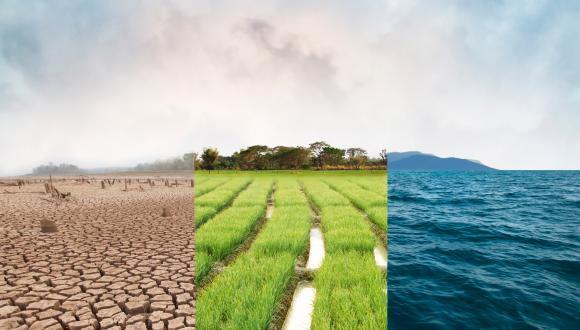What can we learn from the Corona Crisis about the coming Climate Crisis?
In honor of International Meteorology Day, occurring on March 23, we asked Prof. Colin Price of the Department of Geophysics at TAU’s Porter School of the Environmenl and Earth Sciences, Alumnus of the TAU Faculty of Exact Sciences, to enrich the TAU Alumni community with information on the coming climate crisis.
With the international Meteorological Day occurring on 23 March, and the Corona crisis apparently on the way out, it is time to focus on the next crisis knocking at our door: the Climate Crisis. However, the experience we have gained in the last year can be used to help us deal with global warming and the climate change. When we talk about crises and risk management, there are three parameters that need to be considered:
- The hazard itself
- Our exposure to that hazard
- Our vulnerability to the hazard.
The hazard during the corona crisis is a single biological hazard – the COVID-19 virus. For the climate crisis there will be many environmental hazards compounding the risks, from heat waves, droughts, wildfires, floods, hurricanes, storms and also sea level rise. When dealing with exposure, the Corona crisis exposure is limited to the human population. But for the climate crisis, in addition to the population, our infrastructures, our agriculture and water resources are also exposed to the hazards of climate change. However, the largest impacts of both the Corona crisis and the Climate crisis will be due to our vulnerability. Here our health systems, our economies, jobs, poverty, social status, disabilities, age, insurance, globalization of business and supply chains all play a role in our vulnerability to the impacts of both the virus and future climate change. But climate change involves many more factors that impact our vulnerability. These include the quality of construction and infrastructures, unregulated land use and planning, environmental management and overconsumption of natural resources.
There are many similarities between the Corona Crisis and the Climate Crisis:
- Both show exponential growth with limited capacity to cope with the situation. With the Corona Crisis the number of sick and dying increased exponentially resulting in health care systems and hospitals being overloaded and not being able to cope. CO2 emissions are also increasing exponentially around the globe, with no slowdown in sight. And if we pass an unknown threshold we will not be able to safely cope with the impacts of climate change.
- If we wait until you see the impact, it is too late to stop it. It is clear that in many countries the start of the exponential rise in infections was ignored or brushed off as not being serious and not needing action. Those countries that waited too long before acting faced the consequences of high death rates. Those countries that waited too long were overwhelmed by the need for hospital beds, ventilators, masks, doctors, etc. Similarly, with the Climate crisis if we wait too long before we act, it will be too late. If we wait until we "see" the climate change occurring, we may have no way of return. Take sea level rise for an example. If we get a 1 meter sea level rise globally, as predicted by many models for the end of the this century, places like Egypt will have more than 6 million people displaced, with cities like Alexandria under water. Once we see that happening, it will be too late to lower sea level again. Not only will we need to cool the global climate to produce snow and ice sheets on land, but this can take tens of thousands of years to occur.
- Urgency of swift action. It is clear now that countries that took swift action at the start of the Corona crisis fared much better than those that delayed their action. Similarly, countries that increase the resilience of their cities, coastlines, supply chains, water resources, etc. by swift action today will fare a lot better than those countries delaying actions on climate change.
- Both crises are health issues. It is clear for the Corona crisis, but the Climate Crisis is also a health issue. Not only the direct impacts of air pollution from the use of fossil fuels, but many indirect impacts from heat waves, droughts, wildfires, vector-borne disease, floods, etc. In fact, more focus needs to be put on the public health issues of the Climate Crisis to get the public on board.
- In the present crisis we have made huge short-term sacrifices for the long term benefits of saving lives of people in our community. We were all locked down at home, teaching online, working from home, not flying anywhere, not travelling. For the Climate Crisis we will need to also make short-term sacrifices in energy costs, food preferences, transportation costs, and consumer behavior if we wish to see the long-term benefits of climate change mitigation.
However, there are also significant differences between the two crises:
- The dangers are different. The direct danger of the Corona virus crisis is the exponential growth of infected and sick people overwhelming the health care system. The danger for the future Climate Crisis is the exponential growth of greenhouse gases overwhelming our ability to manage natural disasters, sea level rise, climate refugees, ocean acidification, and more.
- While the threat from the Corona virus is immediate and personal, the threat from climate change is slow and can often feel impersonal. Most people know someone infected by the virus, and we see people like us dying. With climate change most people think that they will not be impacted, and it is someone else's problem.
- With the current pandemic, the causes are well defined and clear. We know that the COVID-19 virus is the cause of the crisis, we know what the virus looks like, we can identify it. On the other hand, climate change and the climate crisis are more diffuse. Is it the energy sector that is mainly to blame for rising greenhouse gases, the transportation section, agriculture, or something else? It is difficult to pinpoint who or what is to blame.
- The Corona crisis is a present threat with likely small long-term effects, while the climate crisis is a future threat with likely huge long-term effects. The current pandemic will eventually end, and in ten years we will likely not see any impact on global populations or on the global economy. However, the future threat of climate change will result in many permanent changes to the Earth's climate (including sea level rise) that will have huge long-term impacts on our children, our grandchildren, and their children. Once we pass the tipping points of the climate system, the changes will be with us for centuries into the future, if not millennia.
- Finally, and maybe the most important difference, is that the changes for the pandemic are occurring on timescales of days and weeks. We see the numbers changing daily. Climate change is occurring over years to decades, and hence often the public does not notice these "slow" changes, and hence may think they are less important and less dangerous to their everyday lives.
There are a number of lessons that can be learned from the present pandemic, as related to how we address the next global crisis, the climate crisis. First, we have here another clear example of the importance to listen to the scientists with the knowledge, the data, the models, and the understanding of the problem. From day one of the Corona crisis medical experts and doctors were calling on governments to take this seriously, and to impose draconian measures to protect the public. Some listened, others did not. The climate scientists have been ringing the fire bell for decades now, and they need to be taken seriously.
Second, we need to understand the power of compounding exponential growth to understand the urgency of the climate crisis. If we wait until we see it happening, it will be too late. And as Benjamin Franklin said "an ounce of prevention is worth a pound of cure".
Third, the present crisis gives us a clear example how our actions in one part of the world can impact the entire globe. Whether it is industrialization, deforestation, ocean acidification, or an invisible virus, the actions in one region will impact us all.
Finally, the economic collapse of many industries and businesses around the globe, with the huge unemployment and recession expected, provide us an opportunity like never before (and likely never again). To restart our economies after the Corona Crisis, we have an opportunity to stimulate funding, jobs and investment in low-carbon technologies, like clean power, battery storage, public transportation, etc. to provide a better more resilient future for the next generations, and hopefully to prevent the next global climate crisis. It is not too late to act, and we have been given an opportunity to rapidly change the system.





